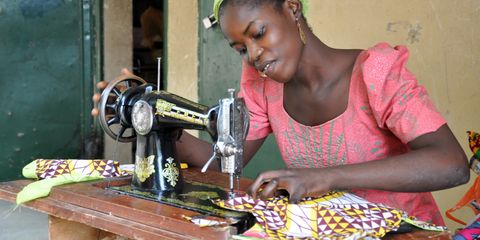Real Choices Real Lives: Out of Time
The Gendered Care Divide and its Impact on Girls.
Plan International’s Real Choices, Real Lives study has been following the lives of a cohort of girls around the world since they were born in 2006.
Now aged 17 and 18 years old, the cohort girls are juggling numerous responsibilities and activities.
As they transition from adolescence to adulthood girls are navigating how to split their time between completing their education and developing skills for the futures, engaging in paid work to further their economic independence, performing unpaid care work in their homes and communities, socialising and participating in community life, and finding enough time to rest and support their wellbeing.
Notably, girls’ unpaid care responsibilities take up large portions of their day and can prevent them from engaging in other activities.
Using historical analysis to look back at the experiences of the Real Choices, Real Lives cohort over the years, we learn the way that girls are inducted into gender roles of unpaid care from a young age, and often internalise unequal divisions of labour in their homes as being ‘natural’ or ‘just the way things are.’
“I do the laundry, wash the dishes, and clean the house. It’s okay with me because of course I’m the woman so I’m obliged to do the housework.”
– Chesa, 15, the Philippines (2022)
Through Real Choices, Real Lives we are afforded the privilege of hearing from girls in their own words; their voices and experiences provide unique insight not often gleaned from large-scale quantitative studies.
We learn from the cohort girls how we can appropriately value the unpaid care work they perform in their homes and communities, and their recommendations for change.
Download the report:
Summary Report – English
4.33 mb
Summary Report – French
4.33 mb
Summary Report – Spanish
4.38 mb
“My brother doesn’t do the housework because there are so many of us girls in the house.”
– Alice, 17, Benin (2024)
Key findings
- Girls perform a disproportionate amount of unpaid care work such as cooking, cleaning and caring for their siblings.
- Entrenched gender norms dictate that care work is a woman’s domain, which perpetuates the unequal distribution of household responsibilities.
- Girls are socialised into gender roles from a young age, and grow up believing this division of care labour is ‘natural’.
- Poverty, poor infrastructure and household composition are multipliers of girls’ care work, as are child marriage and early pregnancy.
- Time poverty affects educational outcomes and has long-term economic consequences.
- High levels of unpaid care have a significant impact on girls’ wellbeing: they report higher levels of stress, fewer hours of sleep, and loneliness and isolation caused by time poverty.
- Unequal division of labour within households reinforces stereotypes that limit girls’ aspirations.
“Instead of just studying, my time is divided between my chores at home.”
– Michelle, 16, the Philippines (2023)
Recommendations for change
From the experiences shared by cohort girls around the world, we learn what they need to support them to exercise their autonomy and agency in making decisions about their time use that allow them to prioritise their interests, education, goals for the future, and wellbeing.
These recommendations include ways that governments, communities, schools and other decision-makers can:
- Recognise the care work performed by girls and the value of these contributions to their households and communities;
- Take practical steps to reduce the amount of care work that girls must perform through the provision of time- and labour-saving devices, technology and services;
- Redistribute care work within households and communities by championing gender transformative education, policies, and initiatives that address gendered social norms and promote men and boys’ greater involvement in care;
- And represent the voices of girls in all levels of decision-making to ensure that their needs and interests are represented in policy design and implementation.
“I’d like to be a strong, determined person, who doesn’t give up on her dreams, who persists until she gets what she wants.”
– Bianca, 17, Brazil (2024)
Download the Technical Report:
For further detail on the findings and research itself, download the technical report:
Technical report – English
2.21 mb
Technical report – French
2.58 mb
Technical report – Spanish
2.42 mb


